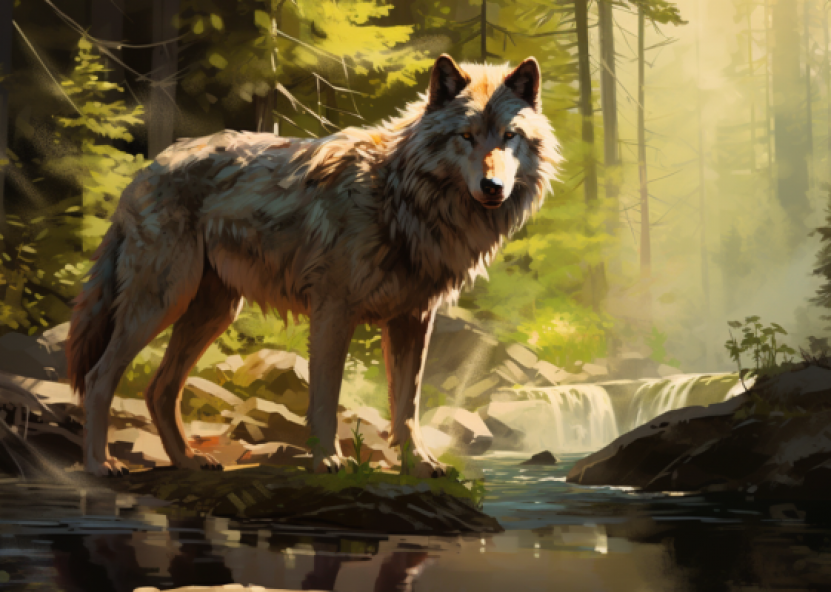Sheep are no longer enough: wolves are chomping on residents' dogs
It's a very turbulent day in the neighbourhood of Obeliai: on Monday morning, Viktorija Maksimova's post appeared on social media, inviting people in the villages of the Obeliai Elderly Municipality (Bučiūnai and Butkūnai) who have been affected by wolves. Only this time the situation is a bit unusual, as the wild beasts are not milking sheep or calves, but... the dogs of the inhabitants.
Nine cases counted
The reason she called on others to come forward and report the attacks was that if all the victims had reported earlier, such a large number of disasters could have been avoided: „When I broke the news that wolves had mauled my parent's dog, I received an incredible number of reports of similar incidents. Some called me, others called my parents, saying that the wolves had taken their pets yesterday, the day before or a couple of weeks ago. I counted 9 dogs in total, and one family lost as many as two pets overnight. And then there are the cases we do not know about. The dogs cut up range from the smallest to the largest. As far as I know, they were all mongrels. My parents' dog was large, medium-sized and tied to a kennel about 10 metres from the house. The wolves near the hut slaughtered him. There is blood, drag marks across the gravel road, accompanied by large footprints near... And here it all takes place in a settlement where – house to house. Not isolated farmsteads“.
V. According to Maksimava, both loose and chained dogs have been slaughtered, even dogs in aviaries. She said she does not expect anyone to rush into action before next week's wolf hunting season, but hopes that once the season starts, hunters will pay attention to these areas and be more patient with the hosting greyhounds.
In the meantime, the inhabitants of the district of Obeliai are urged to be more protective of their dogs at night: lock them up in the stables, bring them into the living room.
They were dragged out of the kennel...
Greta, who lives in Bučiūnai, also lost her pet because of wolves. She said she did not find her female dog tied to a kennel one Sunday afternoon when she returned home. That weekend there was a real wolf party – maybe 4 dogs were slaughtered in the village. There were footprints near my dog's kennel, and the dog had just been pulled out of his collar, which was covered in dog hair. In some places, 3 dogs were taken out at a time. About a kilometre and a half from us, the wolves bit the dog and left it by the rope because it was a big dog. My dog was a small dog, not the kind that would stand up to wolves.
Greta was one of the first to contact the Rokiškis District Municipality Agriculture Department and the Obeliai Elderly Municipality about the wolves that were swarming in the yard.
The woman was encouraged to do so by her dad. I asked him to contact the chairman of the Rokiškis Hunting Society, who told me to contact the municipality's Agriculture Department. Unfortunately, when I explained the situation, it turned out that they were not involved in any way, because a dog is not a domestic animal and they only calculate such losses. And we were left „up in the air“. I called the municipality and they said that they had registered the case.
The situation was not so dramatic
She recalled that this is not the first time that wolf attacks have occurred in the village: last year, several people also lost their pets, but it was not so massive and not so fast. One of the first cases in Bučiūnai this autumn was a month ago, when wolves took a puppy.
A woman did not hide the fact that after this incident she was afraid to go out in the early morning in an unlit yard and get into her car to go to work. She wondered what would happen when the time would soon change and it would be very dark in the mornings – after all, the children would have to reach the bus stop in the dark.
And she, who is somewhat involved in hunting herself, wondered why wolves dare to approach people's houses and hunt dogs.
„You don't even have to ask – a year and a half or two years ago the fields were full of roe deer. I used to drive to work early in the morning and more than one would jump out on the Lukštai-Bučiūnai road. Nowadays you don't see roe deer anymore, they are gone. The wolf population is too high, and the forest is just the remains of the deer that have been cut down. What should be done? Increase the wolf hunting quotas, because it is not easy to hunt wolves anyway," said Greta.









































































































